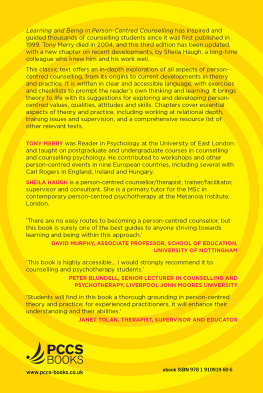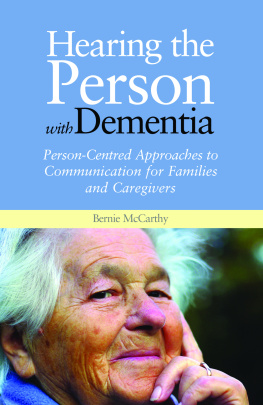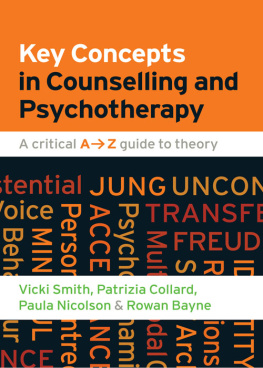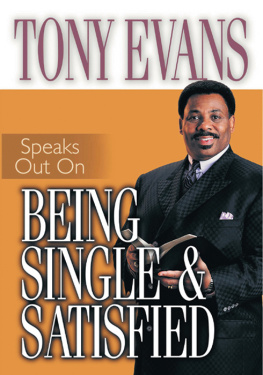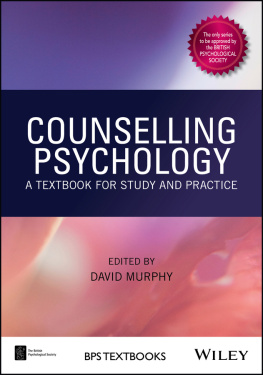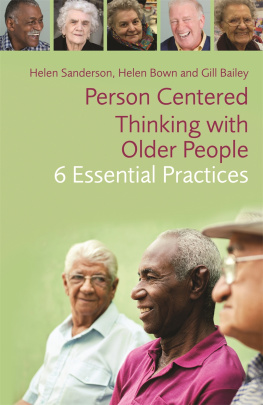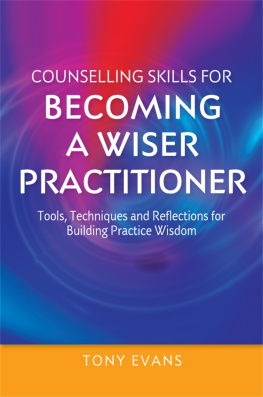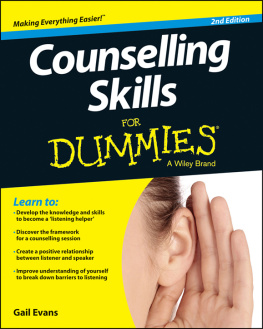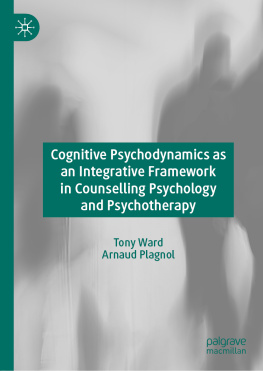Tony Merry - Learning & being in person-centred counselling
Here you can read online Tony Merry - Learning & being in person-centred counselling full text of the book (entire story) in english for free. Download pdf and epub, get meaning, cover and reviews about this ebook. year: 2020, genre: Politics. Description of the work, (preface) as well as reviews are available. Best literature library LitArk.com created for fans of good reading and offers a wide selection of genres:
Romance novel
Science fiction
Adventure
Detective
Science
History
Home and family
Prose
Art
Politics
Computer
Non-fiction
Religion
Business
Children
Humor
Choose a favorite category and find really read worthwhile books. Enjoy immersion in the world of imagination, feel the emotions of the characters or learn something new for yourself, make an fascinating discovery.
- Book:Learning & being in person-centred counselling
- Author:
- Genre:
- Year:2020
- Rating:4 / 5
- Favourites:Add to favourites
- Your mark:
- 80
- 1
- 2
- 3
- 4
- 5
Learning & being in person-centred counselling: summary, description and annotation
We offer to read an annotation, description, summary or preface (depends on what the author of the book "Learning & being in person-centred counselling" wrote himself). If you haven't found the necessary information about the book — write in the comments, we will try to find it.
Tony Merry: author's other books
Who wrote Learning & being in person-centred counselling? Find out the surname, the name of the author of the book and a list of all author's works by series.
Learning & being in person-centred counselling — read online for free the complete book (whole text) full work
Below is the text of the book, divided by pages. System saving the place of the last page read, allows you to conveniently read the book "Learning & being in person-centred counselling" online for free, without having to search again every time where you left off. Put a bookmark, and you can go to the page where you finished reading at any time.
Font size:
Interval:
Bookmark:
Praise for Learning and Being in Person-Centred Counselling (third edition)
Learning and Being in Person-Centred Counselling is a classic textbook that provides essential reading for all person-centred counselling students and experienced practitioners alike. Merry grounds person-centred counselling in its ontological foundations and shows how theory informs our practice and how the counsellors attitudes are essential to their practice. This book is one to which I return time and again to help me learn more about the practice of counselling, supervision and education. This latest edition is skilfully updated by Sheila Haugh to provide fresh updates on relevant research and explore some key recent developments in the field of person-centred theory and practice. There are no easy routes to becoming a person-centred counsellor, but this book is surely one of the best guides to anyone striving towards learning and being within this approach.
David Murphy, Associate Professor, School of Education, University of Nottingham
Learning and Being in Person-Centred Counselling is an important book for any student of counselling and psychotherapy. Each chapter provides the reader with clear explanations of fundamental person-centred concepts. Despite being first published more than 20 years ago, this book remains relevant to contemporary person-centred counselling practice. It is highly accessible to students at any level of study and contains numerous practical exercises to help the reader gain a deeper understanding of person-centred theory. I would highly recommend it to counselling and psychotherapy students and to any readers who wish to acquire a comprehensive understanding of person-centred counselling.
Peter Blundell, Senior Lecturer in Counselling and Psychotherapy, Liverpool John Moores University
Tony Merrys book is both a comprehensive introduction to the practice of person-centred counselling and a useful start point for understanding the development of the approach. He (with Sheila Haughs sympathetic updating) makes reference to the many theorists and practitioners who have influenced the approach, giving the reader an insight into the strands that make up the tapestry of person-centred therapy. It is one of those rare books that is both erudite and accessible. Students who want to understand how to practise person-centred counselling will find useful suggestions and insight into how to accompany a client on their individual journey. The development of the approach is covered with a light but extensive touch and further reading and research are well signposted. Students will find in this book a thorough grounding in person-centred theory and practice; for experienced practitioners, it will enhance their understanding and their abilities.
Janet Tolan, therapist, supervisor and educator
Tony Merrys Learning and Being helped me to find my way into my own person-centred practice. Ive returned many, many times to this book, feeling inspired and encouraged with every new read. The book invites readers to engage deeply with how they might honestly live the theory of the personcentred approach. This process-focused reflexivity, so essential in personcentred practice, makes this newly revised version invaluable and important for readers of all backgrounds. Merrys writing is very accessible without dumbing down the theory. He deftly conveys the philosophy of the personcentred approach with a sophisticated precision and a personal warmth. As a facilitator of person-centred learning groups for many years, Ive experienced how Tonys writing evokes passionate engagement, dialogue and encounter among participants. I would recommend Learning and Being as an essential read for all students of the person-centred approach. This is a rigorous, faithful and trustworthy book for those wanting to learn more about a person-centred way of being.
Graham Westwell, Senior Lecturer in Counselling and Psychotherapy, Edge Hill University, Lancashire
LEARNING
& BEING
IN
PERSON-CENTRED
COUNSELLING
Third Edition
TONY MERRY
Updated by Sheila Haugh

First edition published 1999
Second edition published 2002
Third edition published 2020
PCCS Books Ltd
Wyastone Business Park
Wyastone Leys
Monmouth NP25 3SR
UK
Tel +44 (0)1600 891 509
www.pccs-books.co.uk
Tony Merry 2002 All rights reserved.
Sheila Haugh 2020
Apart from any fair dealing for the purposes of research or private study, or criticism or review, as permitted under the Copyright, Designs and Patents Act, 1988, this publication may be reproduced, stored or transmitted in any form, or by any means, only with the prior permission in writing of the publishers, or in the case of reprographic reproduction, in accordance with the terms of licences issued by the Copyright Licensing Agency. Enquiries concerning reproduction outside those terms should be sent to the publishers.
The authors have asserted their right to be identified as the authors of this work in accordance with the Copyright, Designs and Patents Act 1988.
Learning and Being in Person-Centred Counselling (third edition) ebook ISBN 978 1 910919 60 6
A CIP catalogue record for this book is available from the British Library Paperback ISBN 978 1 910919 59 0
Cover design by Jason Anscomb
Contents
Index of checklists and exercises
Checklists
Exercises
Acknowledgements
Many people have contributed, either directly or indirectly, to this book, and I am grateful to all of them. First, Bob Lusty, a friend and colleague for 25 years, is co-author of the book from which this volume is a development, What is Person-Centred Therapy? . His new ideas, suggestions and contributions have made a substantial and positive difference to this work.
I am particularly grateful to three experienced person-centred practitioners and theorists who made many useful comments on earlier drafts. Barbara Brodley kindly read every word I sent her. Her responses were swift, thoughtful and constructive. If I have succeeded in my aim for theoretical clarity and consistency, much of it is derived from her insightful criticisms of my attempts to provide concise descriptions of complex concepts. Though I doubt if she agrees with every word contained in this book, I took her constructive criticisms very seriously. Any inadvertent misrepresentation of Carl Rogers work is entirely my responsibility.
Thanks too to CH Pat Patterson, a most respected and experienced exponent of the person-centred approach, whose association with Rogers goes back to the very early days. His thoughtful suggestions and supportive comments meant a lot to me.
My heartfelt thanks also go to Godfrey Barrett-Lennard. Goffs work and writings have, over the years, been a source of great inspiration to me. He generously took time from a busy schedule to read sections of early drafts, and his comments enabled me to be clearer in my expression. He gently and with great skill corrected my tendency towards speculation where precision was called for. My admiration for his book, Carl Rogers Helping System: journey and substance (1998), will be evident to even the most casual reader of what follows.
I am indebted to two of my colleagues, Rowan Bayne and Ian Horton, at the University of East London. Their deep knowledge of counselling and counselling psychology provided criticism and feedback from perspectives other than the person-centred approach, and I think this book is the better for it.
Particular thanks and appreciation must go to Pete Sanders and Maggie Taylor-Sanders at PCCS Books. Their unstinting encouragement provided energy when mine was flagging and Petes additional thoughts on Rogers 19 propositions were especially welcome. I am fortunate to live close to them in the heart of the Herefordshire countryside, and I am glad to share its tranquility and scenery with them.
Next pageFont size:
Interval:
Bookmark:
Similar books «Learning & being in person-centred counselling»
Look at similar books to Learning & being in person-centred counselling. We have selected literature similar in name and meaning in the hope of providing readers with more options to find new, interesting, not yet read works.
Discussion, reviews of the book Learning & being in person-centred counselling and just readers' own opinions. Leave your comments, write what you think about the work, its meaning or the main characters. Specify what exactly you liked and what you didn't like, and why you think so.

